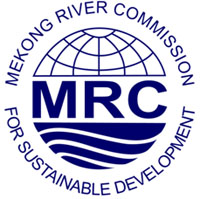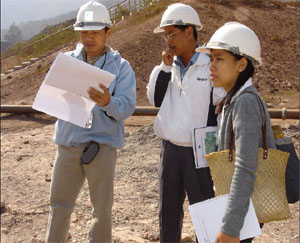Junior Riparian Professional Project

|
||
| Executing Agency: | MRC Secretariat | |
| Implementation: | HRD Section – Integrated Capacity Building programme (ICBP) | |
| Project Title: | Junior Riparian Professional (JRP) Project | |
| Donor: | The Government of Finland | |
| Project period: | 2008-2011 |
Project Overview

Since the signing of 1995 Mekong Agreement, the MRC role has expanded and the focus of basin development competencies has also shifted. New basin-wide activities require different skills, beyond a n exclusive focus on technical issues. In order to create riparian ownership of the MRC and its programmes, the organization needs to focus on how to generate a group of young professionals drawn from the riparian countries, who can work on MRC issues in the future.
The Junior Riparian Professionals are young professionals
working in one of the following institutions:
- National Mekong Committees;
- Line agencies involved in the development and management
of the Mekong River Basin;
- Universities and water resources training institutes;
and
- Tributary river basin organizations.
The MRC Integrated Capacity Building Programme will provide a basic Integrated Water resources Management (IWRM) training opportunity and hands-on experience to forty young riparian professionals over a four-year period. The training will be conducted using a competency-based module which require participants to go through a modular training cycle consisting of three progressive stages: a) “learn to do” – training on the IWRM concepts, techniques and tools to be employed; b) “do to learn” – the trainees are required to apply what they learn to their work assignment with proper coaching from assigned advisors; and c) “share to learn” – the junior professionals will return to their organizations, share their experience with their colleagues and apply the acquired skills.
For sustainability of this JRP Project, capacity building
of riparian training institutes is woven into and implemented
simultaneously with project activities. Technical assistance
and a support mechanism will be established to help former
JRPs to replicate the IWRM modules at their localities. This
will help create a critical mass at provincial and tributary
river basin organization levels.
Gender mainstreaming in water resources development policy
and strategy will be taken into consideration throughout help
this project. Affirmative action will be put in place to target
a rate of 35% women professionals for this phase.
Objective
The project aims to provide training and hands-on experience
to young riparian professionals in core areas of Integrated
Water Resources Management (IWRM). It is also aims to stimulate
the sustainable development of the natural, economic, and
social potentials of the Mekong basin by:
- Raising the level of competence of young riparian professionals
involved in the development of the Mekong River Basin in core
international river basin competencies; and
- Building up the capacity of young academics and members
of tributary river basin organizations in MRC member countries
to enable them to replicate the core MRC training modules
basin-wide.
Indicators
Forty promising young professionals have successfully completed the JRP assignment jargon. This assignment has exposed them to international cooperation, regional trade and investment, programme development and management (in water resources related sectors) and IWRM tools and decision support frameworks. The expected impact of the project will be seen in the functioning of the IWRM network, the application of IWRM skills and knowledge by the young riparian professionals, and the replication of the improved IWRM curriculum by training institutions in the MRC member countries. The project is committed to improving its gender balance by providing support mechanism so that young mothers can participate in the project while caring for their children.
Training Strategy and Curriculum
The JRPs will undergo two-month intensive training on six basic crosscutting modules at the beginning of the programme. This aims to arm them with necessary knowledge and skills in IWRM in the context of the Mekong Cooperation. While undergoing on-the-job training, all JRPs will take an on-line course in Integrated River Basin Management to complement their practical work and expose them to the latest trends and practices in IWRM.
Core Training Modules
During the preparation phase the JRPs will receive the following packages of training modules:
- MRC Orientation: The orientation will provide participants with the MRC Cooperation framework, plus a description and the status of each MRC Programme.
- Integrated River Basin Planning: The course aims to provide basic integrated river basin planning knowledge and skills in the context of Mekong Cooperation.
- Strategic Planning and Management: The course lays a foundation in the strategic planning process and provides practical skills in formulating project and individual workplans to support organisation strategic goals. This will help the JRPs to formulate and improve their OJT project action plans.
- Project Cycle Management and Logical Framework: This module aims to improve the project planning and management skills of learners using Goal Oriented Project Planning and a Logical Framework Approach.
- Gender Mainstreaming in Water Resource Development: This will equip all river basin planners and managers with the necessary skills and tools to incorporate gender perspectives at every stage of project cycles.
- Facilitation skills: This course lays the foundation for all professional river basin planners in facilitating a) group meetings, b) an enabling environment for participatory decision-making, and c) longer term processes involving multi-stakeholder groups.
Special Training Programme
Eeach JRP will undertake a distance training course on Integrated
River Basin Management provided by UNESCO – IHE during
their assignment. This course will provide essential knowledge
and skills on IWRM. Through the on-line IRBM course and work
assignment, the JRPs will also acquire core “Performance
Competencies” which are essential to the performance
of IWRM professionals. These performance competencies identified
in the Integrated Training Strategy are:
- Communication Skills
- Networking and Strategic Alliance
- Cultural and Political Capability
- Team Skills
- Planning & Organising
- Information Management and Action Research
For more information on the IRBM online learning course, please
visit the UNESCO-IHE website at www.ihe.nl
On-the-job training (OJT) and Practical Training Areas
The areas available for OJT are the core MRC competencies:
- International cooperation, programme coordination and donor relations: JRPs will work with the International Cooperation and Communication Section and the Technical Coordination Unit of the MRC and will gain hands-on experience in planning and organising international forums, conferences, meetings; in drafting official letters, reports and official proceedings; observing MRC official functions such as the MRC Joint Committee Meetings, the Council Meeting and Donor Consultative Meetings and dialogues.
- Programme/Project Development and Management Skills: The MRC is an executing agency and the implementing agency for basin-wide development programmes. The programmes presently active are:
- Technical Training: The MRC Information and Knowledge Management Programme and other key programmes have accumulated and developed different tools and decision support frameworks to be used in planning water resource development programme/scenarios. Young lecturers or technical officials like water resource engineers, modellers, or GIS–Mapping Specialists can apply for technical training in specialised area. Again, this training will be very practical and the JRPs will be required to create outputs as listed in the OJT proposal.
a. Environment Programme
b. Basin Development Planning Programme
c. Information and Knowledge Management Programme
c. Information and Knowledge Management Programme
d. Flood Mitigation and Management Programme
e. Agriculture, Irrigation, and Forestry Programme
f. Fisheries Programme
g. Navigation Programme
h. Integrated Capacity Building Programme
The JRP may apply to work as “Associate Project Officer”
in one of the above programmes related to his/her field
of work. As Associate Project Officer, each JRP will be
assigned responsibilities related to his/her OJT project
proposal. This practical assignment will ensure that after
completion, the JRP has really acquired the skills.
Descriptions of available JRP posts in all three categories will be included in the JRP recruitment announcement each year.
Choose a newsletter: